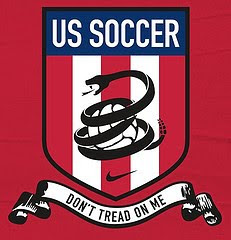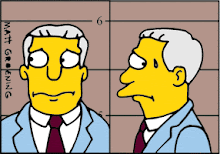The final whistle has blown, and the US are all out of magic. The Americans rode their luck once too often, and have been knocked out of the World Cup as a result. There will be four long years to ponder what could have been, and what will be.
But where do we go from here? There's a lot of positive signs. First, and most obvious, is the young players that got a ton of playing time. Jozy Altidore was maddeningly inconsistent, but he's only 20 years old. By the time Rio rolls around in 2014, he'll be 24 and just starting to take off. Michael Bradley is 22, and is already showing signs of leadership at a young age.
And, of course, Charlie Davies is only 24. Remember Davies? How much different would this World Cup have looked had Davies been available instead of Bob Bradley having to rely on Edson Buddle, Robbie Findley, and Herculez Gomez? Davies is recovering and, if he stays healthy, will be in the prime of his career come 2014.
The US also has a youth academy setup that is just starting to put its' roots down. In 1999, the brass at the national team created Project 2010 with the intent of winning the world up in 2010. Obviously, that goal has fallen a little short. But by setting a target, movement towards it has been achieved. Part of project 2010 was the creation of a development academy which has produced players like Donovan and DaMarcus Beasley. The talent in that pipeline has been growing steadily since.
Another reason to be encouraged is the response to the US loss to Ghana. Yes, there's been a lot of attaboys thrown the way of the US team, and that's appropriate. But there's also disappointment and a little consternation that the US couldn't beat a team that hadn't scored a goal from open play in the tournament.
That is a good thing. We'll know the US has really arrived as a soccer nation when getting out of the group stage is something to be expected, not celebrated. There is a massive difference between hoping for success and expecting success. Right now the US public is somewhere in the middle, and that's probably appropriate given the maturity level of the US national soccer program. But if, as the program grows, the expectations of success for the program grow as well, then the two can feed off each other and push the team to greater heights.
But there's reason to be concerned as well. This team rose and fell in South Africa on the backs of Landon Donovan (27) and Clint Dempsey (28). Four more years will put both of those guys on the wrong side of 30. The Italians tried to ride into South Africa with thirtysomethings leading the way. How'd that turn out for them?
So, it's awfully tough to look four years into the future to see what the squad will look like. But it's fair to say at this point that the 2010 plan (give it to Donovan and hope for the best) will be successful in 2014. While 2010 might have been the breakthrough in terms of attention from the country as a whole, 2014 might be the year that the US can demonstrate that it's a program and not just one standout player.
But the two are a bit synergetic. Greater attention from the fan base as a whole will translate into more talent in the pipeline and better players on the field. So the success of the US in 2014 is very much linked to the success of the 2010 team in capturing the minds of the American sports fan.
And, in that goal, the US were hugely successful. The group stage games drew monstrous ratings for games on cable - and these were games televised at nine in the morning on a weekday. Prior to this World Cup, soccer was the butt of any number of jokes from sports-talk hosts belittling the game for any number of reasons - but mainly because the US wasn't particularly good at the sport.
ESPN's blanket coverage of the World Cup was a big help. By getting coverage on a regular basis, American sports fans are starting to get the feel of soccer as a part of their sports landscape. Having a team in red, white, and blue to cheer it even more a part of the landscape, and having the team succeed in such dramatic fashion puts the icing on the cake. Donovan's stoppage-time winner against Algeria has been described as soccer's "man on the moon" moment. Whether that's true or not remains to be seen.
After all, the American sports fan's interest can be drawn every four years to sports that are otherwise inconsequential. Michael Phelps' mastery of the pool made everyone swimming fans for two weeks in Beijing, but no one is watching a swim meet three weeks after the Olympics ended. Is there any reason to think that soccer won't meet the same fate?
Indeed there is. ESPN has a lot to do with it, I think. When Setanta collapsed at the beginning of last year's Premier League season, ESPN snapped up their rights to Premier League coverage. The result was a season full of Saturday morning live Premier League matches on ESPN. It also meant, thanks to cross-promotion, that the result was a season of Premier League highlights and soccer discussion on SportsCenter. Those highlights get mixed in with ESPN's coverage of Major League Soccer, keeping soccer yet again somewhere in the highlight reel. Again, soccer gets into the mix for a sports fan's daily diet of sports consumption, and isn't something that disappears into the ether for another four years.
So, does that mean that potential success for the US in the 2014 World Cup could be due to the collapse of Setanta Sports? Well, you know what they say about a butterfly flapping its' wings ...
Soccer is sitting on the verge of unprecedented growth in the United States. No, it's never going to displace football (the American kind), baseball, or basketball. But soccer now has a toe-hold on the attention of the "average" American sports fan. Smart marketing from the professional leagues, including a successful reprise of the "summer of soccer" pre-season tour, along with continued interest in the Premier League and continued growth in Major League Soccer will push the game along to where it can be a regular part of the sports landscape in the US.
I happened to be staying in a hotel in rural Illinois with my mother and my wife on the day of the Ghana game. I had my US jersey on, and was in the lobby after the game. I was stopped more than once and asked about the result, and the nature of the questions made it pretty clear that they knew what happened before. As someone who has followed soccer for a while now, I can guarantee you that four years ago, no one in rural Illinois would have known about the US performance in group play. It's likely they wouldn't have known the World Cup was going on.
So there's reason to be hopeful. There's reason to expect the steady growth of soccer throughout the coming years. And there's reason to think that Project 2010 might not have been a pipe dream, but merely a bit premature.
Thank you to Landon Donovan, and the rest of the team for everything you've accomplished. It may have been a small step in the World Cup, but 2010 might well prove to be a giant leap for soccer in the United States.
Subscribe to:
Post Comments (Atom)


No comments:
Post a Comment